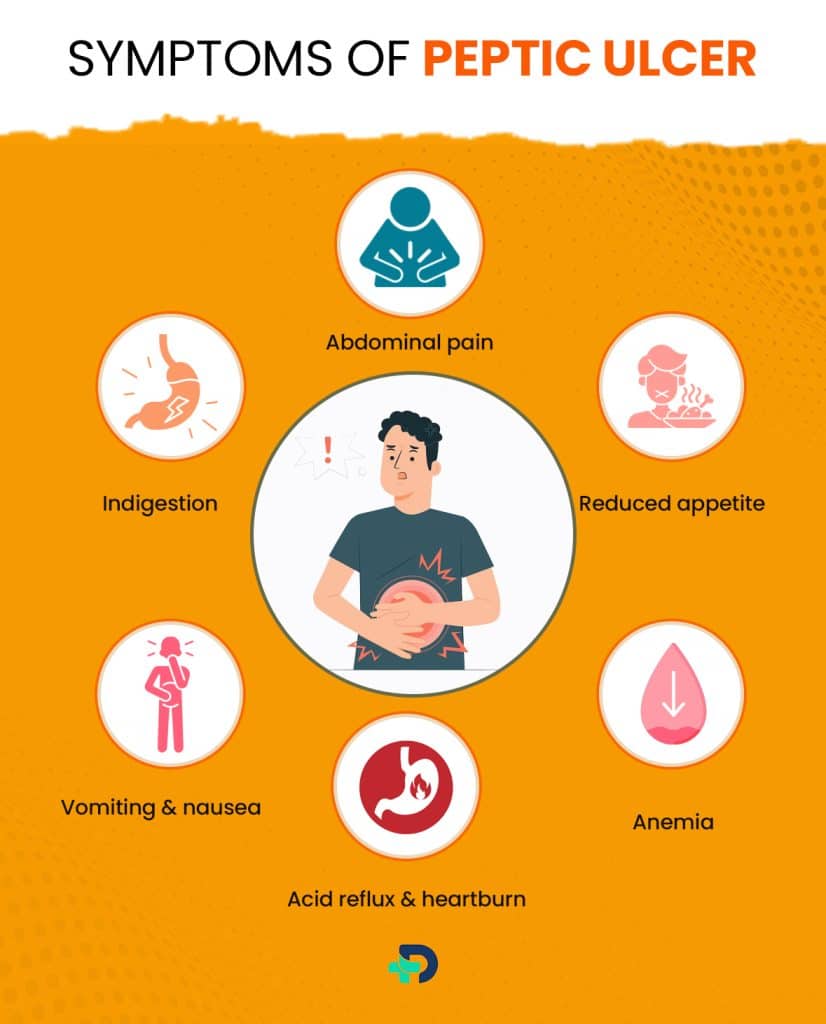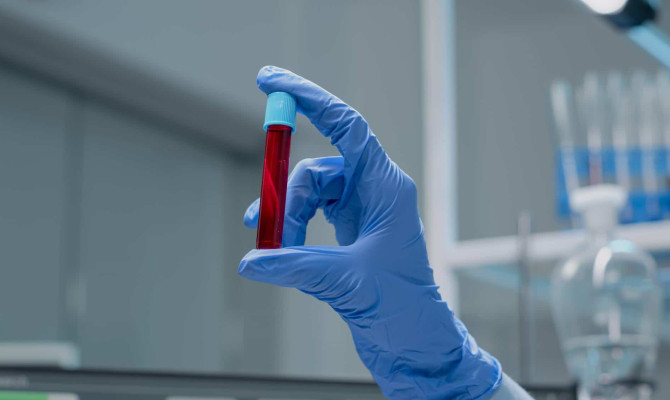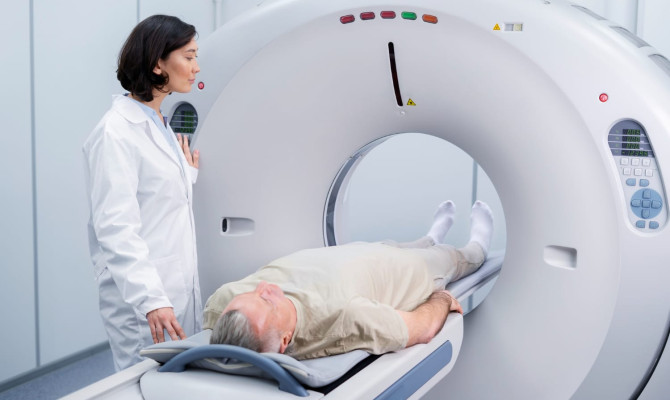Peptic ulcer: Understanding the Causes, Symptoms, and Treatment

- Peptic Ulcer
- 22 Aug 2023
Overview
What is Peptic ulcer?
An open sore or lesion known as a peptic ulcer can develop on the lining of the stomach, upper small intestine (duodenum), or even the esophagus.1Overview| Researched based study from Nlm.nih.gov It occurs when the mucus barrier that guards these organs against digesting acids and enzymes is weakened. The discomfort, pain, and other unpleasant signs from the ulcer may impact an individual’s quality of life.
This article aims to give readers a thorough understanding of peptic ulcers by examining their causes, signs, and potential treatments.

Symptoms

Symptoms of Peptic ulcer
- Abdominal pain
- Indigestion
- Nausea and vomiting
- Loss of appetite
- Heartburn and acid reflux
- Dark or tarry stools
- Fatigue
Some people may not have any symptoms, while others may have a wide range of symptoms. However, typical peptic ulcer signs and symptoms may include:
Abdominal pain
- An ache in the upper abdomen that is dull, searing, or gnawing is one of the defining symptoms.
- The discomfort may come and go and is generally felt between the breastbone and the navel. It is frequently described as a “hunger-like” feeling and may worsen at night or when the stomach is empty.
Indigestion
- They may result in indigestion symptoms such as bloating, feeling full, or discomfort after eating. This can happen right away following a meal or even several hours later.1Symptoms| Researched based study from Nlm.nih.gov
Vomiting and nausea
- Some patients with peptic ulcers may experience nausea or be sick to their stomach, particularly if the ulcer is in the stomach.
- Vomiting occasionally shows blood, which can be red or black, and shows that there has been bleeding.
Reduced appetite
- They may have an impact on appetite, which results in less hunger. Over time, this may cause unexpected weight loss.
Acid reflux and heartburn
- Heartburn, often known as a burning sensation in the chest, can occur in people with peptic ulcers.
- When stomach acid leaks back into the esophagus, this happens. It can be more noticeable if you’re lying down or having a meal.
Dark or tarry stools
- Internal bleeding is indicated by melena, or black, tarry stools. The black color of the feces is due to the presence of digested blood.
Anemia
- Anemia, which causes weariness, weakness, and pale complexion, can develop due to persistent blood loss from a peptic ulcer.1Symptoms| Researched based study from Nlm.nih.gov ,2Symptoms| Researched based study from Nlm.nih.gov
Causes
What leads to a Peptic ulcer?
Causes of Peptic ulcers are:
Infection with Helicobacter pylori
- Helicobacter pylori infection is the primary cause of the majority of peptic ulcers. It is thought that this is the key factor causing stomach and duodenal ulcers.
- It makes the stomach and duodenum’s protective lining more susceptible to harm from stomach acid.
Medications that are non-steroidal anti-inflammatory
- Aspirin, ibuprofen, naproxen, and some prescription drugs that are NSAIDs can all prolong the risk.
- These can harm the stomach lining and impair its capacity to defend against stomach acid.
Excessive stomach acid production
- An imbalance in the production of stomach acid can lead to ulcers.
- They can develop due to diseases like Zollinger-Ellison syndrome that increase acid production.
Lifestyle factors
- Certain lifestyle decisions may make it more likely. These include drinking too much alcohol, which can irritate the stomach lining, and smoking, which can slow recovery and increase the chance of recurrence.
Stress
- It can aggravate pre-existing ulcers or slow the healing process, even though it does not cause peptic ulcers. It may increase stomach acid production, increasing the risk of developing ulcers.
Genetic factors
- Some people are genetically predisposed to developing them. The likelihood of causing harm to the stomach lining may increase due to certain hereditary features.1Causes| Researched based study from Nlm.nih.gov ,2Causes| Researched based study from Nlm.nih.gov
Diagnosis
How are Peptic ulcers diagnosed?
Medical information
- The doctor will ask you questions about your symptoms, their duration, and any situations that make them worse as part of a full medical history.
Examination of the body
- This could be done to look for symptoms like bloating or stomach soreness.
Lab Tests for peptic ulcers
Following lab tests are suggested by health care professional:
An H. pylori test
- Because Pylori infection is a frequent cause, your doctor might suggest testing to look for this bacterium. A blood test, stool antigen test, breath test, or endoscopy with biopsy may be used.
Endoscopy
- During this procedure, an endoscope—a little, flexible tube with a light and camera—is introduced via the mouth and into the esophagus, stomach, and duodenum.
- It enables the physician to closely see the organs’ lining up and any irregularities or infections.
Upper gastrointestinal series
- The esophagus, stomach, and duodenum are coated with a contrast material during this test, also referred to as a barium or barium feast. Taking X-rays to check for any irregularities is the next step.
- Checking for anemia (low red blood cell count) or other indications of associated bleeding can be done using in-lab assays.
Evaluation of the complications
- Additional testing could be requested if there are signs of problems. They include imaging tests such as CT scans or endoscopic ultrasounds to determine the extent.4Diagnosis| Researched based study from Nhs.uk
Treatment
How are Peptic ulcers treated?
Medications
Medicines prescribes to treat peptic ulcers are:
Proton pump inhibitors (PPIs)
- By lowering the production of stomach acid, they promote the healing of ulcers. Depending on the severity, they are frequently recommended for several weeks to months.
Blockers of histamine-2 (H2)
- H2 blockers help to ease symptoms and speed up recovery by lowering the production of stomach acid.
Antibiotics
- A combination of antibiotics is typically recommended to get rid of the H. Pylori bacterium. Usually, this course of treatment takes a few weeks.
Cytoprotective agents
- These medications support recovery and lower the risk of problems by protecting the duodenal and stomach walls.3Treatment| Researched based study from Nlm.nih.gov
Lifestyle changes
Lifestyle suggestions to manage peptic ulcers are:
Avoiding irritation
Dietary changes
- A balanced diet that includes lean meats, fruits, and vegetables can help the body heal itself. Eating a few smaller meals more frequently rather than a few larger ones may also be beneficial.
Stress reduction
- Decreased stress levels can help prevent ulcer symptoms from getting worse. Effective stress management methods include exercise, relaxation techniques, and counseling.5Treatment| Researched based study from Nlm.nih.gov
Complications
Complications of a Peptic ulcer
If disregarded or poorly managed, peptic ulcers can result in several consequences. These can vary in severity and might need further medical attention. Some of them consist of the following:
Bleeding
- They may result in bleeding, which may appear as tarry, dark stools, or hematemesis (blood in the vomit).
- Anemia can result from significant bleeding, which may require immediate intervention.
The obstacle to the gastric outflow
- A peptic ulcer close to the pylorus, where the small intestine connects to the stomach, can produce swelling and scarring, narrowing the path.
- Due to an obstruction of the gastric outlet, symptoms like bloating, nausea, vomiting, and considerable weight loss may occur.
Recurrence and chronic ulcers
- They are more likely to return if the underlying cause, such as H. pylori infection or NSAID use, is not properly treated.6Complications| Researched based study from Researchgate.net
Prognosis
What is the prognosis?
Peptic ulcer prognosis can change depending on a number of variables, including the underlying cause, the patient’s general health, the presence of complications, and the prompt start of the right therapy. Most ulcers can heal fully and have a good prognosis with careful management and devotion to medication.
Any feedback on this article?
 This Articles content was accurate
This Articles content was accurate Very Informative Article
Very Informative Article I have a question or a comment
I have a question or a comment
 This article contains inaccurate content
This article contains inaccurate content This article was not helpful
This article was not helpful I have a question or a comment
I have a question or a comment
We appreciate your helpful feedback!
Checkout our social pages
References
-
National Library of Medicine
Peptic Ulcer Disease | Overview | Causes | Symptoms
-
National Library of Medicine
Peptic Ulcer Disease and Helicobacter pylori infection | Overview | Causes | Symptoms
-
National Library of Medicine
Pharmacological Management of Peptic Ulcer: A Century of Expert Opinions in Cecil Textbook of Medicine | Treatment
-
National Health Service
Diagnosis -Peptic ulcer | Diagnosis
-
National Library of Medicine
Nutritional care in peptic ulcer | Treatment
-
Research Gate
Complications of Peptic Ulcer Disease | Complications






































